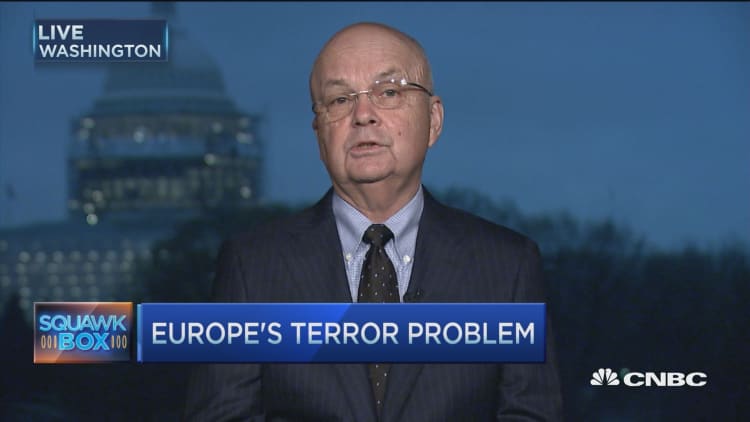


The EU may have to compromise on privacy protections in order to defeat terrorism, former CIA director Michael Hayden said Monday.
"In the European Union, the division of labor between the union government and the national governments is that questions of commerce and of privacy are held by the Brussels bureaucrats. Questions of security remain in national capitals," Hayden told CNBC's "Squawk Box."
"What you've got are the folks in Brussels, the Euro institutions, imposing incredibly high standards with regard to personal privacy at the expense of what the national governments are still expected to do, which is keep their citizens alive."
Belgian authorities said Monday the death toll from the Brussels terrorist attacks last week rose to 35. Additionally, they said Saturday three more suspects had been charged with terrorist offenses.
The Brussels bombings came four months after more than 100 people were killed in Paris attacks executed by the so-called Islamic State.
In another "Squawk Box" interview, Eurasia Group President Ian Bremmer said: "Clearly we are getting inured [in the U.S.] to the level of continual terrorist attacks that's occurring across the European continent. How much we feel like we need to do about that is a problem for the United States. It's a bigger problem for the Europeans."
"The fact is we have huge attacks in places like Turkey, Iraq and Afghanistan that make no impact whatsoever. In Europe, it has a bigger impact because we understand and we connect to that more. But even there, the level that requires us to really pay attention … has been getting higher and higher."
If these attacks continue in Europe, there could be long-term economic ramifications for the continent, Atlantic Council CEO Fred Kempe said on "Squawk Box."
"The Schengen [agreement allowing open borders in EU countries] could absolutely collapse, and if it collapse, you could have an EU collapse with it," he said.
The Schengen pact not only facilitates travel, but also commerce. Kempe said the 2015 free trade flow between Schengen members was $2.8 trillion and that "people estimate 10-to-20 percent of that could be lost."


